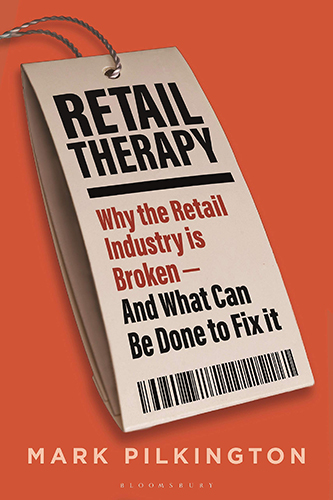This year’s ACI EUROPE Airport Commercial & Retail Conference & Exhibition, hosted by Prague Airport, takes place on 21-23 April 2020. The First Working Session – entitled “Good cop, bad cop – technology is simultaneously good and injurious to airport retail possibilities” – will feature a defining presentation by Mark Pilkington, Brand Expert, Entrepreneur, Motivationalist and Thought Leader and Consulting Director, Bolt Partners.
He is author of thought-leading book on the D2C revolution: “Retail Therapy. Why the Retail Industry is Broken – And What Can Be Done to Fix it.”

Commenting on his own experiences of airport retail, Mark Pilkington, Brand Expert, Entrepreneur, Motivationalist and Thought Leader and Consulting Director, Bolt Partners, highlights: “Very pressurised time slot to buy gifts for family”; “Having to carry bulky bags through crowded waiting areas”; “Mainly luxury brands, for which I am not the target audience”; and “Duty free no longer priced below online offers”.
There has never been a period where retailers and brands have been under so much pressure. At the ACI EUROPE Airport Commercial & Retail Conference, Pilkington’s defining presentation – “Survive the (airport) retail apocalypse” – will focus on how technological change is reshaping everything, while demographics are changing, and the balance of power has shifted from sellers to buyers.
“The development of ecommerce has created a new channel that enjoys many advantages over stores retailing – cost, convenience, choice and personalisation,” says Pilkington. “The spread of peer-to-peer communication has undermined brands’ control over product information. Retailing is a high fixed cost business, that is vulnerable to the loss of the ‘top-slice’ of revenue. It is a culturally-conservative industry that has not responded fast to these changes.”
The combination of these three forces is wiping out many incumbent retailers in high-ecommerce penetration markets like the UK and the US, and putting brands and property owners under pressure.
“Retailers, brands and property owners need to respond by changing their operating model away from one based on stock availability – now done better online – towards one based on the things that physical spaces can still do best – theatre, customer service, experiences, education and community,” Pilkington explains.
Creating retail experiences that cannot be obtained online
In terms of new consumer behaviours that airports and retailers need to be aware of, Pilkington highlights that younger consumers – Millennials/Generation Z – are relatively poor compared with previous generations at the equivalent age because of the asset price boom, unaffordable housing, and generational inequality – over-45s own 85% of wealth.
“Their values have changed,” says Pilkington. “They value transparency and authenticity over image, sustainability over consumption, community over individualism, experiences over ownership. They are ‘footloose’ and love to travel, but lack the means. Ecommerce discounting has undermined the idea of a national ‘Recommended Retail Price’ – younger consumers no longer regard duty free as a bargain.”
Indeed, this highlights the importance of creating special retail experiences, which cannot be obtained online.

Mark Pilkington, Brand Expert, Entrepreneur, Motivationalist and Thought Leader and Consulting Director, Bolt Partners is author of thought-leading book on the D2C revolution: “Retail Therapy. Why the Retail Industry is Broken – And What Can Be Done to Fix it.”
Pilkington also emphasises the need for airport retailers to develop their own online businesses, in cooperation with the airlines, to offer a wider range of products – including a more moderate-priced range – than that which they can offer in their physical terminals. “By working with the airlines, they could do personalised marketing in the pre-travel time window, thus extending the period available for purchasing, with the additional bonus of convenient delivery direct to the gate.”
In order to remain relevant in this brutal new environment, Pilkington recommends that brands select which retail customers are going to survive and focus on them – “Go direct to the consumer to compensate for the loss of retail ‘doors’.”
He adds that property owners should move to more flexible leasing models to allow brands, including D2C brands, to run short-term customer recruitment drives. “De-cost and de-skill the retail set-up process by offering ‘plug and play’ spaces, pre-loaded with retail tech and skilled contract staff.”
Delegates will hear more at this year’s ACI EUROPE Airport Commercial & Retail Conference & Exhibition, hosted by Prague Airport, 21-23 April 2020.







